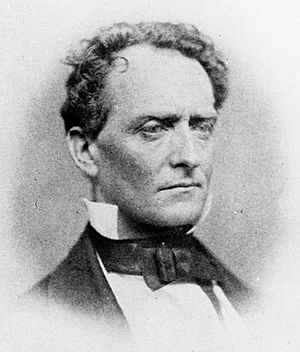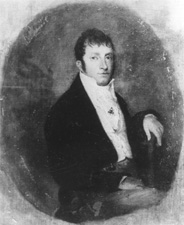Robert Ward Johnson facts for kids
Quick facts for kids
Robert Ward Johnson
|
|
|---|---|

Johnson in 1858
|
|
| Confederate States Senator from Arkansas |
|
| In office February 18, 1862 – March 18, 1865 |
|
| Preceded by | New constituency |
| Succeeded by | Constituency abolished |
| Delegate from Arkansas to the Provisional Congress of the Confederate States |
|
| In office May 18, 1861 – February 17, 1862 |
|
| Preceded by | New constituency |
| Succeeded by | Constituency abolished |
| United States Senator from Arkansas |
|
| In office July 6, 1853 – March 3, 1861 |
|
| Preceded by | Solon Borland |
| Succeeded by | Charles B. Mitchel |
| Member of the U.S. House of Representatives from Arkansas's At-large district |
|
| In office March 4, 1847 – March 3, 1853 |
|
| Preceded by | Thomas W. Newton |
| Succeeded by | Constituency abolished |
| 1st Attorney General of Arkansas | |
| In office February 3, 1843 – September 25, 1843 |
|
| Governor | Archibald Yell |
| Preceded by | New office |
| Succeeded by | George C. Watkins |
| Personal details | |
| Born | July 22, 1814 Scott County, Kentucky, U.S. |
| Died | July 26, 1879 (aged 65) Little Rock, Arkansas, U.S. |
| Cause of death | Dysentery |
| Resting place | Mount Holly Cemetery, Little Rock, Arkansas, U.S. 34°44′15.3″N 92°16′42.5″W / 34.737583°N 92.278472°W |
| Political party | Democratic |
| Spouses |
Sarah Frances Johnson
(m. 1836–1862)Laura S. Johnson
(m. 1863) |
| Children | 6 |
| Parent |
|
| Relatives | Conway-Johnson family |
| Alma mater | St. Joseph's College |
| Occupation | Farmer, planter, lawyer |
| Profession | Agriculture, legal |
| Signature | |
Robert Ward Johnson (born July 22, 1814 – died July 26, 1879) was an American lawyer and planter. He became a very important politician in Arkansas. He served as a Confederate States Senator for Arkansas. He was elected to this role in 1861. Before that, he was a delegate for Arkansas in the Provisional Congress of the Confederate States from 1861 to 1862.
Contents
Early Life and Education
Robert Ward Johnson was born on July 22, 1814. His birthplace was Scott County, Kentucky. His parents were Benjamin and Matilda Johnson. His family was very involved in politics. His father's three brothers were all elected to the U.S. Congress.
The Johnson family owned a lot of land. Robert's grandfather had bought thousands of acres in the late 1700s. The family also owned enslaved people. Robert had a sister named Juliette. His uncle, Richard Mentor Johnson, was a U.S. Representative and Senator. He even became the Vice President of the United States under President Martin Van Buren.
Moving to Arkansas and Early Schooling
In 1821, when Robert was seven, his family moved to Arkansas Territory. His father was appointed as a judge there. They settled in Little Rock. Later, in 1836, his father became the first federal judge in the new state of Arkansas.
Robert was sent back to Kentucky for school. He attended the Choctaw Academy. His uncle Richard Johnson had started this school in 1825. It was on his farm near Georgetown. The school mainly taught Choctaw boys from the Southeast. They learned English and European-American culture. The U.S. government paid his uncle well for this.
Sometimes, 200 to 300 boys attended the academy. The Choctaw students were there before the Indian Removal of the 1830s. This was when many Native American tribes were forced to move. Robert later studied at St. Joseph's College in Bardstown. He graduated from there.
Becoming a Lawyer and Family Life
After college, Johnson returned to Little Rock. He studied law by working with an experienced lawyer. In 1835, he became a lawyer.
In 1836, he married Sarah Frances Smith. They had six children together. Only three of their children lived to be adults. Sarah died in 1862 during the American Civil War. The next year, Robert married Sarah's younger sister, Laura. He was 49 years old. They did not have any children together.
Political Career in Arkansas
In Little Rock, Robert Ward Johnson quickly became involved in the Democratic Party. From 1840 to 1843, he was the prosecuting attorney for Little Rock. This meant he acted as the state's lawyer.
His sister Juliette married Ambrose Hundley Sevier. Ambrose later became a U.S. Senator from Arkansas. Both Johnson and Sevier were part of a group called The Family. This group included men who were related by marriage or politics. They had a lot of power in Arkansas politics before the Civil War.
Serving in Congress
Before the American Civil War, Johnson moved his family to Helena, Arkansas. He started his law practice there. In 1846, he was elected to the U.S. House of Representatives. He served in the Thirtieth, Thirty-first, and Thirty-second Congresses.
While in the House, he became the chairman of the House Committee on Indian Affairs. His brother-in-law, Ambrose Sevier, was also chairman of the Senate Committee on Indian Affairs at the same time.
Johnson decided not to run for reelection in 1852. However, he was then appointed to the United States Senate. He filled the remaining term of Senator Solon Borland. In 1855, the Arkansas legislature elected him to a full Senate term. He served until March 3, 1861.
Role in the Civil War
After the American Civil War began, Johnson became a delegate. He represented Arkansas in the Provisional Government of the Confederate States in 1862. He then served as a member of the Confederate Senate from 1862 to 1865.
Later Life and Death
The American Civil War ended Robert Ward Johnson's political career. He lost a lot of his wealth because of property damage and the end of slavery. After the war, he worked as a lawyer in Washington, D.C. for over ten years.
In the late 1870s, he returned to Arkansas. He tried to get reelected to the Senate in 1878 but was not successful. Robert Ward Johnson died in Little Rock in 1879. He is buried in the historic Mount Holly Cemetery there.
See also
- List of Freemasons
- List of Confederate States senators
- List of people from Kentucky
- List of United States representatives from Arkansas
- List of United States senators from Arkansas
Images for kids
 | Selma Burke |
 | Pauline Powell Burns |
 | Frederick J. Brown |
 | Robert Blackburn |


